Giving a patient medications in the ER, having them pop positive on a test, and then withholding further medications because…
News 2/8/13
The VA and Department of Defense give up their contentious, expensive, and multi-year effort to develop a common EMR, deciding instead to keep their existing VistA and AHLTA systems and settle for a common user interface and unstated interoperability. They plan to launch a pilot in the summer of 2013 with a general rollout in 2014. The now-abandoned project, begun in 2011 with the declaration that VistA and AHLTA were outdated and lacking functionality, was supposed to have been completed in 2017. According to Secretary of Defense Leon Panetta:
We recognize that bringing together two large bureaucracies, trying to make those bureaucracies work together to form a seamless support system for all service members and veterans is not an easy challenge … It’s been inefficient for service members to have to hand-deliver records from one system to another when they get out of the military. It doesn’t make a hell of a lot of sense … Our goal had been to complete this effort by 2017 … our worry is, how long is it going to take to get to that goal? And what is going to be the price tag to get to that goal? And how many times is it going to be delayed? … Rather than building a single integrated system from scratch, we will focus our immediate efforts on integrating VA and DoD health data as quickly as possible, by focusing on interoperability and using existing solutions. This approach is affordable, it’s achievable, and if we refocus our efforts, we believe we can achieve the key goal of a seamless system for health records between VA and DoD on a greatly accelerated schedule. We’re now directing our departments to do just that.
We have just witnessed hundreds of millions of dollars go down the drain. I’m disappointed that our nation’s two largest government agencies – one of which is the world’s foremost developer of high-tech machines and cyber-systems – could not come together on something that would have been so beneficial to those that served.
Reader Comments
From Billy East: “Re: McKesson Provider Technologies. Major re-org, with changes in leadership over Horizon Clinicals and other changes in Analytics and Relay divisions.” Unverified.
From Printgeek: “Re: McKesson. Has rolled its Physician Practice Solutions business into its RCM business along with Medisoft, Lytec, Practice Partner, Practice Choice, and now MED3OOO.” Unverified. The e-mail include the departure of an executive I won’t name at the moment, along with predictions of product sunsetting that are speculation at this point. I’ve seen no announcements, changes in the company’s Web pages, or updates to the LinkedIn profiles of those named.
From Tar Heal: “Re: UNC Health Care. Rolling out its Epic plan.” Not only did UNC avoid choosing a gimmicky name for its Epic project, they created a project logo that incorporates Epic’s identity along with their own. Go-live is planned for the spring of 2014.
From Primus: “Re: HIPAA. It’s halfway between sad and embarrassing when folks who lecture on HIPAA spell it incorrectly.” They hedged their bets by sometimes spelling it HIPPA, sometimes HIPAA.
HIStalk Announcements and Requests
![]() My BFF Dr. Jayne and I are already working on our HIMSS party calendar. She has tasked me with securing the invites while she works on the logistics of how to attend the most events in a limited amount of time. We are partial to soirees that are open to all HIStalk readers, such as Divurgent’s summHIT Balcony Party on Sunday, March 3. If your organization is sponsoring an event that is open to all of our readers, we are happy to mention it on HIStalk and of course add ourselves to the attendee list.
My BFF Dr. Jayne and I are already working on our HIMSS party calendar. She has tasked me with securing the invites while she works on the logistics of how to attend the most events in a limited amount of time. We are partial to soirees that are open to all HIStalk readers, such as Divurgent’s summHIT Balcony Party on Sunday, March 3. If your organization is sponsoring an event that is open to all of our readers, we are happy to mention it on HIStalk and of course add ourselves to the attendee list.
![]() A few must-read items from HIStalk Practice from the last week: CAGH launches an EFT enrollment tool that allows providers to enroll with multiple payers through a single online process. The Boston Globe profiles eClinicalWorks and its new patient engagement inititative. The percentage of medical claims filed electronically has nearly doubled between 2002 to 2011. Denial rates for established office visits range from 44 to 65 percent. HIT adoption by FQHCs is associated with significant improvements in care. Brad Boyd of Culbert Healthcare Solutions offers thoughts on practices shifting to a core vendor prior to ICD-10 implementation. Dr. Gregg wonders if Meaningful Use is getting lost in translation. I like to think of myself as a gal who doesn’t require much to keep her smiling: a hot pair of shoes, a nice glass of wine, and a few new HIStalk Practice readers every month. Make me smile. Thanks for reading.
A few must-read items from HIStalk Practice from the last week: CAGH launches an EFT enrollment tool that allows providers to enroll with multiple payers through a single online process. The Boston Globe profiles eClinicalWorks and its new patient engagement inititative. The percentage of medical claims filed electronically has nearly doubled between 2002 to 2011. Denial rates for established office visits range from 44 to 65 percent. HIT adoption by FQHCs is associated with significant improvements in care. Brad Boyd of Culbert Healthcare Solutions offers thoughts on practices shifting to a core vendor prior to ICD-10 implementation. Dr. Gregg wonders if Meaningful Use is getting lost in translation. I like to think of myself as a gal who doesn’t require much to keep her smiling: a hot pair of shoes, a nice glass of wine, and a few new HIStalk Practice readers every month. Make me smile. Thanks for reading.
What we like: (a) people who subscribe to our e-mail updates on HIStalk, HIStalk Practice, and HIStalk Connect; (b) connecting with readers via Facebook, LinkedIn, and Twitter; (c) seeing nice stats indicating that readers are interested in the ads of our sponsors and are clicking them for more information, as well as checking out the Resource Center and Consulting RFI Blaster; (d) getting rumors and news online, by e-mail, or on the Rumor Line telephone, with details to your right; and (e) getting support for what we do from readers, contributors, and sponsors. All of us (Inga, Dr. Jayne, Travis, Lt. Dan, Donna, and I) do this part time after work, and that wouldn’t be possible without help of a variety of types, for which we say thanks.
On the Jobs Board: Healthcare Industry Solutions Director, Software Product Development Manager, Senior Applications Engineer, Director of Marketing.
I keep getting e-mails asking for HIStalkapalooza details that I’ve already spelled out on HIStalk twice, so here’s one final notice for the skimmers: registration is still open. Sign up and then read HIStalk and watch your e-mail for details – please don’t e-mail me with questions or requests because I barely have time to sleep as it is (not to mention I would be spending time replying to people who don’t read HIStalk anyway). So far it looks like maybe 100 or so presidents and CEOs have signed up from my quick scan down the list. My favorite attendee title: “CEO Wife/Mistress” (should we hold one spot or two?) while one (male) attendee volunteered that, “I am willing to wear high heels just to get in.” The event draws the most interesting crowd of anything at HIMSS because not only are HIStalk readers smarter, funnier, and sexier (scientific proof available on request), we get a stimulating mix of internationally known executives, CIOs, CMIOs, trench warriors, consultants, clinicians, investment bankers, sponsor people, and government officials who know their stuff and also know how to have a good time. I’m also happy to report that next year’s HIStalkapalooza in Orlando is already sponsored, as is the 2015 version in Chicago.
HIStalkapalooza sponsor Medicomp Systems will once again host its Quipstar game show in the HIMSS exhibit hall, offering fun competition, tee shirts, prizes, and cold drinks (beer and Ingatinis are mentioned, and I had the former last year). Register to play here. The grand prize is super cool: two business-class airfares to Bangkok, a 10-day stay in Medicomp’s corporate apartment, and two executive physicals at Bumrungrad International Hospital. Thai food is among my favorites and it’s shockingly cheap there, which just might be reason enough to go. Check out a disguised Inga at 0:25 in the video from last year above.
Acquisitions, Funding, Business, and Stock

Athenahealth reports Q4 results: revenue up 26 percent, EPS $0.29 vs. $0.26, beating earnings estimates by $0.01.
Analytics vendor Health Data Vision raises $2.8 million in Series A funding.
Nuance reports Q1 results: revenue up 28 percent, EPS –$0.07 vs. $0.03, falling short on revenue and earnings. Shares are down more than 15 percent in after-hours trading. On the earnings call, Chairman and CEO Paul Ricci said reduced transcription volumes due to increased EMR adoption and the company’s own Dragon Medical software will hurt the company’s healthcare growth until business picks up for its computer-aided coding and clinical documentation offerings.
Mobile health technology provider Diversinet Corp. is awarded two US and Canadian patents related to “bring your own device” security .
Sales
Vancouver-based Fraser Health contracts for dbMotion’s interoperability platform.
Mercy Health System (MO) selects MModal Fluency for Coding workflow platform for its network of 26 hospitals and clinics.
Huron Valley Physicians Association (MI) chooses e-MDs as a preferred EMR partner for its 700 members.
The OneBlood, Inc. (FL) blood center licenses Mediware’s HCLL Transfusion software.
The HealtheConnections RHIO (NY) selects Mirth’s HIE technology.
People
Rose Ann Laureto (UNC Health Care) is named CIO of ProMedica (OH).
Acusis promotes KB Anand to CEO.
Hearst Media extends the responsibilities of First Databank President Gregory Dorn, MD, MPH to deputy group head of Hearst Media, where he will oversee business-to-business services in the automotive, electronic, and finance industries along with the company’s healthcare brands MCG (the former Milliman Care Guidelines), First Databank, Zynx Health, and Map of Medicine. I interviewed him in September 2012.
Health Catalyst appoints John Haughom, MD (PeaceHealth) CMO and SVP.
AHIMA hires Deborah Green (LaVie Care) as EVP/COO and promotes Denise Froemming to EVP/CFO.
Announcements and Implementations
QuadraMed will offer Q-Matic’s self-service technology for managing patient flow through its enterprise Access Management suite.
EClinicalWorks will invest $25 million over the next year to enhance and expand its patient engagement tools in its healow business unit.
OSF HealthCare System goes live on sharing its seven-hospital Epic information with other participants in the Central Illinois HIE using ICA’s CareAlign exchange platform.
Cogdell Family Clinic (TX) implements scanning technology from EDCO Health Information Solutions to eliminate its paper-based medical records.
Truven Health Analytics launches HIE Advantage Analytics for the analysis of HIE utilization and population management.
ICSA announces a mobile app testing program to help enterprises determine if their supported apps are properly protecting sensitive data.
Government and Politics
CMS will develop a new records systems to facilitate quality reporting for long-term hospital care.
What ever happened 2 #blueButton Health assistant developed back in 2010 4 patients 2 download EHR data ? adobe.ly/TRhKNe
— Sherry Reynolds (@Cascadia) February 8, 2013
Good question. Adobe won a VA prize in 2010 for a slick Blue Button project using Adobe Air. It would be fun to revisit old announcements occasionally to see which turned out to be fluff, BS, or wishful thinking.
CHIME’s comments on ONC’s proposed patient safety plan emphasize that methods of matching patients to their data are inconsistent and a growing problem with HIEs, although it fell short of providing the obvious but politically deadly solution of a national patient identifier. CHIME also expressed concern that patient safety event data collection might take a lot of provider time and urged ONC to turn implementation of the patient safety plan to an organization that isn’t under direct government control.
ONC’s Farzad Mostashari throws down the gauntlet to the minority of EHR vendors that aren’t forthright in their pricing, that write unfair contracts, and that hold customer data hostage to prevent them from moving to another system, warning that if those vendors don’t step up, “We will go back to the regulatory process.”
Secretary of the Army John McHugh visits the National Center for Telehealth and Technology in Joint Base Lewis-McChord, WA. It offers video chat-based mental health consultations to soldiers in remote locations.
Senator Robert Menendez (D-NJ), new chair of the Senate Foreign Relations Committee, acknowledges that he tried to intervene in a billing dispute between CMS and his largest political donor, a Florida ophthalmologist who was ordered to replay $8.9 million for overbilling Medicare for an eye drug. The Senator, who also admitted to inappropriately using the doctor’s private jet, tried to convince CMS that the billing rules were confusing.
Other
A national survey finds that the most-hated job in America, as scored by those holding the position, is IT director. Sales and marketing director came in at #2, product manager at #3, senior web develop #4, technical support analyst at #8, and marketing manager rounding out the list at #10. Companies should probably be concerned if their sales and marketing executives are that miserable.
AHRQ and CMS announce a new EHR format for children’s health that includes recommendations for child-specific data elements such as vaccines, prenatal and newborn screening tests, growth data, and child abuse reporting.
A study in Health Affairs finds that care costs averaged $88 less per episode when delivered via an online clinic versus traditional settings, with strong effectiveness indicators and a 98 percent “would recommend” consumer rating.
A county commissioner and Tea Party leader in Michigan casts the lone dissenting vote in considering the health department’s request for new Medicaid billing software, explaining, “My worry is that if it’s part of (electronic health records or EHR)—which is Obamacare. I’d like to make sure our information is not being collected. You’d be selling your health care and your liberty to Big Brother. We should make darn sure this is not part of the EHR system … I feel our records would be better off kept in private hands.”
A KLAS report finds that ED physicians believe best-of-breed ED systems offer better clinical decision support, usability, and documentation accuracy compared to enterprise ED systems. The highest-ranked best-of-breed vendors are Wellsoft, Picis, T-System, and Medhost, while Epic takes the top spot among enterprise vendors.
The ECRI Institute Patient Safety Organization looks at HIT-related safety events, identifying five problem areas:
- Inadequate data transfer between systems
- Entering data on the wrong patient
- Making data entry mistakes
- HIT system bugs
- Configuration errors
Security analysts find a vulnerability in Internet-connected devices manufactured by Honeywell that could allow hackers to take control of large-business environmental systems, some of which they identified as belonging to hospitals. Hacking the device could also provide direct access to a hospital’s network since they are often direct connected via Ethernet.
World-renowned Johns Hopkins neurosurgeon Ben Carson, MD (played by Cuba Gooding Jr. in 2009’s “Gifted Hands: The Ben Carson Story”) makes his fellow presenter President Obama squirm at the National Prayer Breakfast with his suggested alternatives to Obamacare: “We spend a lot of money on health care, twice as much per capita as anyone else in the world, and yet not very efficient. What can we do? Here’s my solution. When a person is born, give them a birth certificate, an electronic medical record, and a health savings account to which money can be contributed pre-tax from the time you’re born to the time you die.” He also said that the government is fiscally irresponsible and needs to place more emphasis on education.
Santa Clara Valley Medical Center (CA) is fined $100,000 after patient dies after going into cardiac arrest without receiving treatment for nine minutes. The patient’s monitor leads had become disconnected and the technician called for a nurse via overhead page at 1:27 a.m., but the nurse said she didn’t hear it. The hospital, thankfully, says it has developed a better way to notify nurses. Google tells me that Vocera’s headquarters building is less than two miles from the hospital in San Jose and the hospital is a Vocera customer, so that’s probably a much better solution than waking patients up with middle-of-the-night overhead pages that could be missed.
Twelve patients file suit against North Shore University Hospital (NY), claiming that medical records face sheets were stolen and their information used to file fraudulent tax returns, charge credit cards, and open cell phone accounts since 2010. The suit claims that a theft ring operated for more than a year, but patients weren’t notified.
The top 10 executives of non-profit Carolinas HealthCare System (NC) each earned more than $1 million in 2012, including $4.76 million for the CEO.
I was amused that Dr. Jayne uses the word “pop” below in referring to fizzy sugar water, which I know is a regional term since I’m fascinated by stuff like that (calling the midday meal “dinner,” referring to a rubber band as a “gumband,” declaring the side of the road to be a “berm” instead of a curb, etc.) Then I remember that there’s an Internet, meaning someone has devoted their very existence to studying the “pop” phenomenon, so that’s the graphic above. The yellow parts of the country call it “pop,” the blue say “soda,”and the purple refer to it generically as “Coke” (although my favorite is the unlisted variant I always heard from my Southern relatives, “Co-Cola.”)
Perhaps this OB-GYN shouldn’t have chastised her tardy patient on Facebook. The hospital has reprimanded her and is reviewing her posts after reports that some may have contained patient information. I would add that she should be reprimanded for starting a sentence with “so,” an appallingly lame and unnecessary verbal crutch that seems to be ubiquitous these days.
Sponsor Updates
- SuccessEHS says it has doubled in size since January 2011 with the hiring of 295 new employees.
- Surgical Information Systems demonstrates interoperability for each IHE profile at the 2013 IHE Connectathon.
- Forbes recognizes iSirona, Kareo, and Ping Identity on its list of the country’s most promising privately-held, high-growth companies.
- Levi, Ray & Shoup opens a branch office in Westchester, IL.
- Elsevier launches the MEDalternatives database, which gives users access to drug cost savings options through access to information on alternative therapies.
- Vocera donates its communication technology to MedShare (GA), a non-profit that recovers and redistributes surplus medical supplies and equipment to developing countries.
- Access hosts a February 12 Webinar profiling Norman Regional Hospital (OK) and its use of Access products to advance paperless initiatives.
EPtalk by Dr. Jayne
HIMSS alert: For those of you who may be out cavorting with vendors or clients in the Big Easy, a recent study shows that mixing alcoholic drinks with diet pop may lead to higher blood alcohol levels than using regular pop. The study was small with only 16 participants and attributes the effect to diet pop moving more quickly through the stomach.
Speaking of vendors, clients, and cocktails: CMS released the final rule on the Sunshine Act this week. Starting March 2014, pharmaceutical and medical device must report payments to providers for consulting fees, honoraria, gifts, food, entertainment, travel, and charitable contributions. There will be a 45-day review period for physicians to ensure the accuracy of any information submitted. The rule is 287 pages long and it’s already been a long day, so anyone who wants to send me highlights is welcome. Instead of stale pickup lines accompanying offers to buy me a drink, I’m sure I can look forward to, “Hey baby, what’s your NPI?”
I’ve received lots of reader comments on my recent piece regarding hospital budget cuts and administrative ridiculousness. Some of my favorites:
- “I thought it was bad when they stopped emptying our trash daily and told us all food-type trash needed to go to the kitchen and that if any varmints or bugs appear, each department would be charged for pest control.”
- “They started vacuuming during the day because it is cheaper. So you are on conference calls or any type call and along comes the high-powered vacuuming. Also lights have been dimmed, so you practically need a flashlight.”
- “My most ridiculous administrative experience occurred smack dab in the middle of the current recession. Senior management felt our product was so critical they decided to raise prices. I could only shake my head in amazement and easily forecast the impending carnage to come… and did it ever come! Our competitors had a field day as clients dropped us like a bad habit!
Keep the stories coming. I really do enjoy reading your comments and knowing that our hospital isn’t the only one that has totally lost its collective mind.
ICD-10 challenge: I had a patient present this morning with eye pain which she attributes to staying up all night reading Fifty Shades of Grey. The best part of the encounter was that my scribe had never heard of it, and watching his face as the patient tried to explain what the book was about was priceless. I guess I’m stuck with a nonspecific code for exposure to other specified factors. Any suggestions?
Contacts
Mr. H, Inga, Dr. Jayne, Dr. Gregg, Lt. Dan, Dr. Travis.
More news: HIStalk Practice, HIStalk Connect.




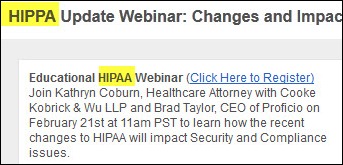
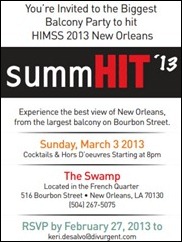
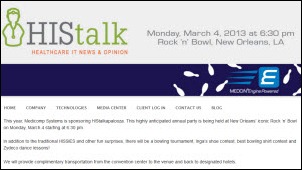


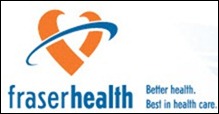

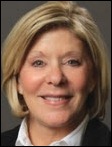



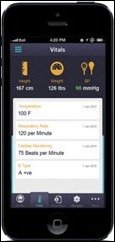

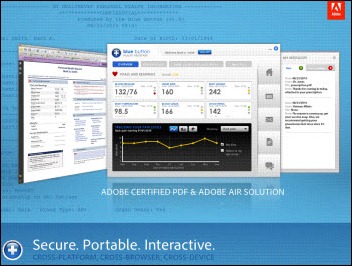


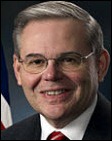
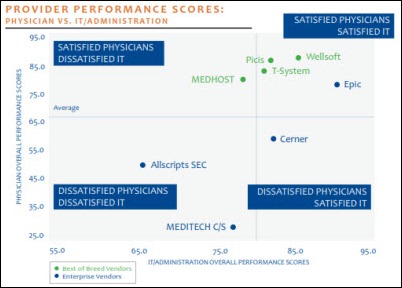
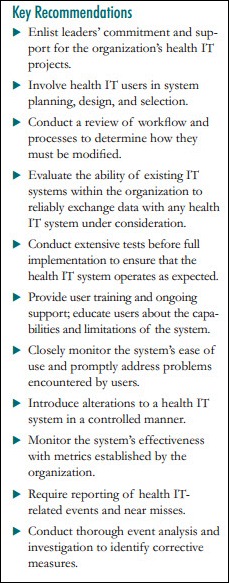




The KLAS ED report also says that Meditech was rated a 2.9 (on a scale of 10) for usability… its amazing what the Meditech hospitals are putting the ED docs through…
… requesting scientific proof of your assertion that HIStalk readers are “sexier (scientific proof available on request)”. 😉
[From Mr. H] You just provided proof by recognizing yourself as part of the cohort! Unless you want to dispute the self-provided evidence, that is. You’ve convinced me, anyway.
I am wondering what possessed Farzad M of ONC to threaten HIT vendors with regulation. He makes the comment: “Government regulation can help in that case, but it’s not the most preferable way.” What is the preferable way, may I ask?
When it comes to medical devices and pharmaceuticals that have adverse consequences to patients and when big bucks are involved, there must always be oversight to protect the patients.
Considering his aggressive position on avoiding FDA oversight of HIT systems of devices, I am shocked that he used regulation as a threat. He must have heard some awful stuff.
Originally from Pittsburgh, PA, but living in Minneapolis for 30+ years, I haven’t heard “pop,” “gumband” or “berm” for many years. If you’re interested in language, check out: http://www.pittsburghese.com/ to learn how to understand people from Pittsburgh. Minnesotans still ask me “you’re not from here, are you?” I wonder how some of these regional dialects affect language used in medical records?
I think the OB-GYN should feel free to gripe about her job on Facebook, as most of us do — but not publicly. See the little World icon next to the date? That means anyone (ANYONE) can see her post. She could set up her privacy settings so that either all status updates or specific posts as she writes them, are only shown to friends and family, and not the world at large. For example, if I post to Facebook something I wouldn’t want my work friends to see, I restrict people on my “colleagues” list from seeing it. It’s not that difficult to set up and use. People – especially professional people in the public eye – should figure this out and use it.
Facebook has a pretty good primer on all the options: http://www.facebook.com/help/325807937506242/
Is there a link to the national survey about the most hated jobs in America?
They must not have surveyed anybody in the greater Tampa area. Employees of a certain company there will tell you that any job with that company is miserable…
ICD 10 remarkably specific sometimes, nonspecific others. The eye stuff is pretty nonspecific if you don’t have more of an anatomic anomaly. H53141, 2, 3 or 9 for visual discomfort , right, left bilateral or unspecified respecitively, , H57.10-H57.13 for ocular pain, this time unspecified, right, left, bilateral respectively. Not very consistent, and nothing about burns secondary to scuba goggles on fire or anything like that.
Thank you! I am so appreciative of all the work you all do regularly, but even more so in the lead up to HIMSS. The timely updates, event announcements and the colorful commentary eases everyones HIMSS experience no matter their specific HIMSS role (attendee, vendor, speaker,etc). Just wanted to pass along before things get too crazy!